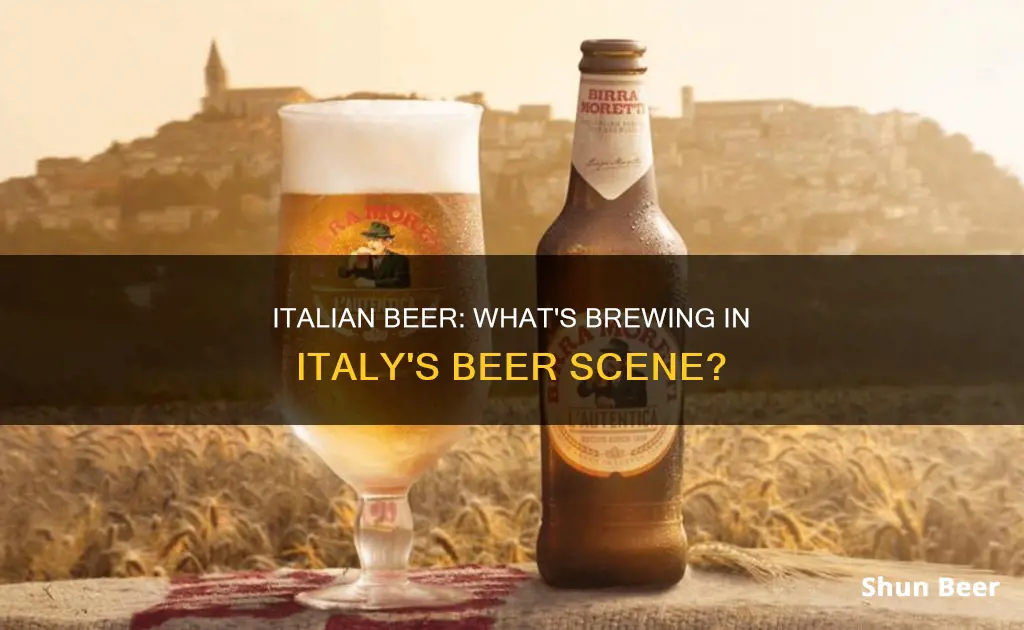
Italy is known for its wine, but beer is also a popular drink. In fact, in recent decades, Italy has upped its beer-making game, and beer lovers around the world can now enjoy Italian-made beers. Beer is traditionally considered an ideal accompaniment to pizza, and since the 1970s, it has become much more popular for drinking in other situations. While well-known Italian brands such as Peroni, Moretti, and Nastro Azzurro have been around for a while, microbrews are also becoming trendy, with small, local craft brewers popping up around the country.
| Characteristics | Values |
|---|---|
| Country | Italy |
| Consumption per capita per year | 30 litres |
| Common beer type | Mass-produced pale lager |
| Beer accompaniment | Pizza |
| Oldest and most well-known brewery | Peroni |
| Peroni alcohol content | 5.1% |
| Other popular beers | Cortigiana, Nastro Azzurro, Quarta Runa, Messina Beer, Menabrea, Lambrate Ghisa, Angelo Poretti, Birra del Borgo, Birra Raffo, Dreher, Ichnusa, Birrificio Dr. Barbanera, Birra Messina, Moretti, Birra Pedavena, Poretti |
| Microbreweries | Over 500 nationwide |
What You'll Learn

Popular Italian beer brands
Italy may be known for its wine, but beer is also a popular drink. In fact, beer is often enjoyed as an alternative to wine during lunch or dinner, and it's a must for a cookout or pizza night!
Italy has several well-known beer brands, including Peroni, Nastro Azzurro, and Moretti, which are available worldwide. Peroni, founded in 1846, is considered the Italian beer par excellence. It's produced in three factories in Rome, Bari, and Padua, and is known for its carefully selected raw materials and meticulous production processes. Its classic lager is undoubtedly its best-selling and most appreciated beer, but it also offers several "special" beers, including the four variants of Peroni Gran Riserva, Peroni Chill, and Peroncino.
Nastro Azzurro, part of the Peroni family, is the best-selling Italian beer globally, exported to over 70 countries. It has been around since the 1960s and is known for its dry and fragrant flavour with an intense aroma of hops and an alcohol content of 5.1%.
Moretti, founded in 1859 in Udine, is another iconic Italian beer brand. It quickly became the symbol of its city, with some buildings and public places bearing its name. Moretti is known for its easy-to-drink blends, perfect for a hot day under the Italian sun. The brand has also ventured into producing regional beers, including Sicilian, Piedmontese, and Tuscan varieties.
While these three brands are the most widely recognised, there are several other Italian beers worth mentioning. Cortigiana, a golden ale with notes of vanilla and cinnamon, is a popular choice during hot summer evenings in Italy. Menabrea, an old and timely brand, offers a range of beers, with their Bionda Lager and Amber Ambrata being the most popular. Lambrate Ghisa, a delicately bitter and easy-drinking beer with a rich, dark profile, is another unique Italian brew.
In recent years, microbrews have also gained traction in Italy, with small, local craft brewers popping up across the country. Italian craft brewers typically use high-quality, local ingredients and apply their wine-making expertise to beer brewing, resulting in innovative and flavourful creations.
Beer and Blood Pressure: Drinking Before a Test
You may want to see also

Beer and food pairings
Italy is predominantly a wine-drinking country, but beer is also widely consumed. In fact, beer is traditionally considered the ideal accompaniment to pizza.
Italian beers tend to be mass-produced pale lagers, with Peroni and Nastro Azzurro being the most popular. However, in recent years, microbreweries have been popping up across the country, with small, local craft brewers experimenting with unique ingredients and innovative brewing techniques.
Pizza
Brown ales and lagers go well with bacon and pineapple pizza. The saltiness of the bacon contrasts with the brown ale's caramel undertones, while the sweetness of the pineapple complements the malt aromas of the lager.
Pasta
A crisp Saison pairs well with a large dish of pasta. The rustic flavour of the beer complements the acidity of tomato-based sauces, and the beer's crispness also cuts through creamy pasta dishes.
Red Meat
While red wine is typically paired with red meat, a boozy bock beer or a Saison during the summer can also complement an Italian T-bone steak.
Fish
La Rossa Birra Moretti is an award-winning double malt beer that pairs well with fish, among other foods. Its deep amber colour and flavours of dark chocolate, toffee, and molasses make it a bold choice to accompany your seafood dishes.
Dessert
Italian barley wine is an excellent choice to pair with creamy desserts such as Panna Cotta or Tiramisu. It is sweeter and lighter in flavour than fortified wines like port, making it a perfect match for rich, indulgent treats.
So, while Italy may be famous for its wines, don't sleep on the diverse and exciting range of beers the country has to offer, and the unique food pairings that come with them!
Beer and Levofloxacin: Is It Safe to Drink?
You may want to see also

Microbreweries and craft beer
Italy is known for its wine, but it has also become a significant beer producer in recent decades. While mass-produced pale lagers are common, the country has also seen an explosion in microbreweries and craft beer.
The first Italian craft breweries opened in 1995, and by 1996, the niche market began to take off. In 2010, there were 300 craft breweries, and by 2017, this number had grown to 718, with 225 brewpubs. Today, there are nearly 1000 craft breweries and brewpubs in Italy.
Italian craft brewers tend to infuse their beers with local ingredients, creating a sensory experience that reflects the region's rich culinary heritage. They often use indigenous grains and incorporate herbs and spices, showcasing a commitment to quality and a celebration of local flavours.
Craft beers in Italy come in a wide range of styles and tastes, much like wine. This variety means that each craft beer can be paired with different foods and dishes. For example, a spiced beer might be paired with sushi, fish, pasta, or pizza, while a stout could be enjoyed with blue or aged cheeses or a chocolate dessert.
Craft beers differ from industrial beers in several ways. Craft beers are unpasteurised and unfiltered, and they do not undergo thermal processing after fermentation. They have a higher alcohol content than industrial beers, ranging from 3.3% to 14%, with most falling between 4.5% and 6.5%. Additionally, craft beers often have a deposit at the bottom of the bottle due to the absence of micro-filtering.
Italy's microbreweries and craft breweries are known for their innovation and passion for brewing. They are run by young, passionate brewers who research ancient beer styles, malt types, grain cultivars, and traditional brewing techniques to create unique, high-quality beers.
- Birra Montegioco: This microbrewery, located in Piedmont, is known for its Quarta Runa beer, brewed with local peaches.
- Birrificio Wild Raccoon: With locations in Udine and Rovereto, they create unique beers with a touch of Italian ingenuity.
- Brasseria Della Fonte: This brewery has multiple locations across Italy, including Pienza and Pianoro.
- Birrificio Stradaregina: Based in Vigevano and Porto Sant'Elpidio, they showcase a strong connection to their territory and history in their beers.
- Birrificio Menaresta: With locations in Carate Brianza, Mezzano, and Rho, they produce a variety of craft beers, including a stout and an India Pale Ale.
- Birra del Carrobiolo: This Monza-based brewery creates craft beers with a focus on flavour and quality ingredients.
- Birrificio Foglie d'Erba: With locations in Forni di Sopra, Bassano Romano, and Pavia, they produce a range of craft beers, including a fruit beer and a stout.
Beer and Weight Gain: Fact or Fiction?
You may want to see also

Beer and breweries by region
Italy is predominantly a wine-producing and consuming country, but it also has a thriving beer industry. While mass-produced pale lagers are common, there are also many craft breweries across the country, with over 500 microbreweries and breweries in total.
Lombardy
Brasseria Della Fonte, Birrificio Wild Raccoon, Birrificio Stradaregina, Hammer - Italian Craft Beer, Birrificio Menaresta, Jungle Juice Brewing, and Birrificio Altotevere are all based in Lombardy.
Tuscany
Brasseria Della Fonte and Birrificio dell’AltaVia are found in Tuscany.
Veneto
Birrificio Wild Raccoon, Birrificio dell’AltaVia, and Birra del Carrobiolo are based in the Veneto region.
Piedmont
Birrificio Montegioco, Birrificio dell’AltaVia, and Birrificio Foglie d'Erba are found in Piedmont.
Emilia-Romagna
Brasseria Della Fonte, Birrificio Wild Raccoon, Birrificio dell’AltaVia, and LIQUIDA Birrificio Indipendente are based in Emilia-Romagna.
Lazio
Brasseria Della Fonte, Birrificio Montegioco, LIQUIDA Birrificio Indipendente, and Birra del Carrobiolo are found in the Lazio region.
Campania
Birrificio Wild Raccoon, Bonavena Brewing Company, LIQUIDA Birrificio Indipendente, and Birrificio Porta Bruciata are based in Campania.
Marche
Birrificio Stradaregina, Bonavena Brewing Company, LIQUIDA Birrificio Indipendente, and Birrificio Porta Bruciata are found in the Marche region.
Liguria
Birrificio dell’AltaVia is based in Liguria.
Friuli Venezia Giulia
Birrificio Wild Raccoon and Birrificio Foglie d'Erba are found in Friuli Venezia Giulia.
Trentino-Alto Adige/Südtirol
Birrificio Wild Raccoon, Birrificio Menaresta, and Birrificio Foglie d'Erba are based in Trentino-Alto Adige/Südtirol.
Abruzzo
Jungle Juice Brewing and Birrificio Porta Bruciata are found in Abruzzo.
Umbria
Birrificio Altotevere is based in Umbria.
Beer and Laryngitis: Is There a Link?
You may want to see also

Beer exports
Italy may be known for its wine, but beer is also widely consumed and produced in the country. In fact, beer exports from Italy have reached an all-time high of about 3.5 million hectolitres, with the UK, Netherlands, France, Romania, Germany, and Malta being the top importers within Europe, and the USA, Australia, and South Africa being the top importers outside of Europe.
The most popular Italian beer worldwide is Peroni, owned by the Asahi group. It was founded in 1846 and is produced in factories in Rome, Bari, and Padua. Peroni Nastro Azzurro, part of the Peroni family, is the best-selling Italian beer, exported to over 70 countries. It is made using local corn that is exclusive to Italian soil and has an alcohol content of 5.1%Birra Moretti, which was founded in 1859 in Udine. It is now owned by Heineken and is produced at their factory in Milan. Moretti beers are known for being easy to drink and complementing a hot day under the Italian sun.
Other well-known Italian beer brands include Menabrea, Birra Messina, Angelo Poretti, and Cortigiana. Italian brewers often infuse their beers with local ingredients, such as indigenous grains, herbs, and spices, reflecting the rich culinary heritage of the region.
Beer Drinking: Healthy Habit or Health Hazard?
You may want to see also
Frequently asked questions
Some popular Italian beers include Peroni, Nastro Azzurro, and Birra Moretti. Peroni is the oldest and most well-known brewery in Italy, and its beers are known for their strong, unapologetic flavour. Nastro Azzurro is the best-selling Italian beer in the world and is exported to over 70 countries. Birra Moretti is one of the most famous Italian beer brands abroad and is known for its easy-to-drink blends.
Italy is primarily known for its wine, but beer is also commonly consumed in the country, especially as an accompaniment to pizza. In recent decades, Italy has significantly improved its beer-making capabilities, and there are now more than 500 breweries nationwide. Italian craft brewers typically use high-quality, local ingredients and apply techniques from wine-making to their beer brewing.
Some examples of craft Italian beers include Cortigiana, a golden ale with notes of vanilla essence and cinnamon; Re Hop Birrifico Toccalmatto, an American-style pale ale with peach and grapefruit notes; and La Rossa Birra Moretti, a double malt with flavours of dark chocolate, toffee, and molasses.







